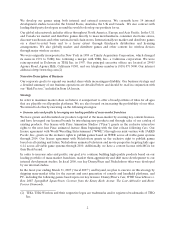THQ 2006 Annual Report Download - page 18
Download and view the complete annual report
Please find page 18 of the 2006 THQ annual report below. You can navigate through the pages in the report by either clicking on the pages listed below, or by using the keyword search tool below to find specific information within the annual report.
10
Our industry is in a transition phase and the introduction of new platforms could materially impact the
sales of our products.
In recent years, we have successfully developed video games for the Microsoft Xbox, Nintendo GameCube
and Sony PlayStation 2. In late 2005, Microsoft launched its new console, the Xbox 360. Sony has
announced plans to launch the PlayStation 3 and Nintendo has announced plans to launch the Wii in late
2006. When new platforms are announced or introduced into the market, consumers typically reduce their
purchases of entertainment software products for current platforms in anticipation of new platforms
becoming available. Duringthese periods, sales of our game console entertainment software products may
be expected to slow or even decline until new platforms are introduced and achieve wide consumer
acceptance. If sales of our products unexpectedly decline due to slowing consumer demand during this
transition, this could materially impact our financial results.
Additionally, delays in the launch of the platforms, hardware shortages, technical problems or lack of
consumer acceptance of the next generation platforms could adversely affect our sales of products for
these platforms, adversely affecting sales of products we develop and publish for the platforms.
During the platform transition, pricing for our products may decline, materially impacting our revenues
and profitability.
As demand for games on the current generation of platforms declines, the prices of our games may also
decline. Reduced pricing of our products may result in credits or allowances to our customers, which could
materially affect our profitability.
Platform transitions are generally marked by escalating development costs, which could materially affect
our profitability.
New platforms have historically required the development of new software and also have the effect of
undermining demand for products based on older technologies. Because product development cycles are
difficult to predict, we must make substantial product development and other investments in technologies
for a particular platform well in advance of introduction of the platform. If the platforms for which we
develop new software products or modify existing products are not released on a timely basis or do not
attain significant market penetration, or if we develop products for a delayed or unsuccessful platform, our
business and financial results could be significantly harmed.
We must continue to develop and sell new titles in order to remain profitable.
Our profitability has directly resulted from our ability to develop and sell successful new titles for use on
multiple platforms. Consumer preferences for games are difficult to predict, and even the most successful
titles remain popular for only limited periods of time, often less than six months. The life cycle of a game
generally consists of a relatively high level of sales during the first few months after introduction, followed
by a decline in sales. In some instances, a sales decline may also be accompanied by decreasing sales prices,
which may result in credits or allowances to our customers.
We rely on a relatively small number of licensed brands for a significant portion of our sales.
Games we develop based upon a small number of licensed brands make up a substantial portion of our
sales each year. In fiscal 2006, sales of titles for our three top-sellingbrands, Disney / Pixar, Nickelodeon
and World Wrestling Entertainment (“WWE”) comprised 47% of our net sales; in fiscal 2005, 52% of our
net sales were based on titles from such brands; and in fiscal 2004, 50% of our net sales were based on
titles from such brands. A limited number of licensed brands may continue to produce a disproportionately
large amountof our sales. Due to this dependence on a limited number of brands, the failure of one or
























